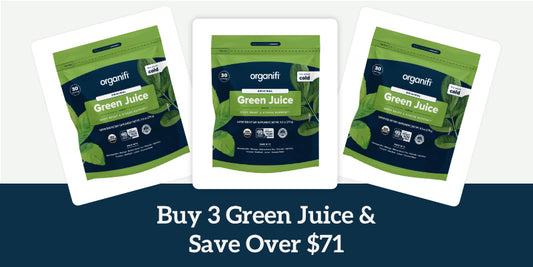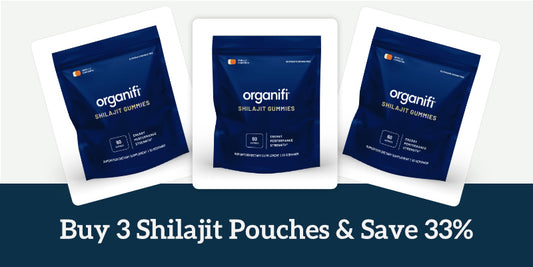Have you ever heard about monk fruit? It is a superb natural sweetener and a powerful superfood that may bring you many health benefits.
Is it safe though? Can it affect your blood sugar? Does it have unpleasant side-effects, such as headaches?
Let’s dig in and understand monk fruit a little bit more.
(Spoiler: The short answer is that monk fruit is awesome with no known side-effects, but all the health benefits).
What Is Monk Fruit?
Monk fruit, also known as Luo Han Guo, is a potent superfood originating from the mountains of Thailand and China. It has been used for thousands of years by Chinese medicine and also as a natural sweetener.
It is becoming increasingly popular in the West. Monk fruit is now an important part of certain superfood products, such as Organifi Green Juice and Organifi Complete Protein, giving them a sweet taste and providing health benefits without damaging your body.
Is Monk Fruit Safe?
Monk fruit may be absolutely safe to consume. It has been rigorously tested and reviewed by authorities. It is one of the eight low and no-calorie sweeteners that is approved by the Food and Drug Administration (FDA). It has been found to be safe by other leading global health authorities, such as the European Food Safety Authority (EFSA), Health Canada, and the FAO/WHO Joint Expert Committee on Food Additives (JECFA).
There may not be any currently known side-effects of monk fruit. However, there are no long-term studies on this superfood, so it is best to pay attention to your body and its reactions.
How Does Monk Fruit Affect Blood Sugar
Monk fruit has been used as a natural no-calorie sweetener.
Past studies have found that monk fruit may stimulate insulin secretion using an in vitro cell model, suppress the rise in glucose levels in rats.
You may notice a common theme though. None of these studies are human studies and most studies on monk fruit have been done on animals.
Though the FDA and other health authorities have found monk fruit to be completely safe and studies have shown its benefits, there is still little research to truly understand the benefits and effects of this superfood.
There is one recent randomized study that was done on monk fruit using human subjects, comparing the effects of aspartame, stevia, monk fruit and sucrose.
Participants were randomly given an aspartame-sweetened, monk fruit-sweetened, stevia-sweetened or table sugar-sweetened beverage. Their blood sugar levels were measured over 24 hours. Overall there was no significant difference found.
All subjects started their day with the same standard breakfast and a drink with one of the same sweeteners. They were given lunch only about an hour later when their blood sugar and energy intake were both measured.
It seems like that those who had any low-calorie sweeteners (artificial or natural) ate more than those who had a regular sugar drink. What they saved in calories by choosing ‘zero-calorie’ options, they made up for their meal during lunch.
More interestingly, their glucose response did not differ either. Those who drank the sugar water experienced a greater blood sugar and insulin spike initially. Aspartame, monk fruit and stevia did not cause an initial spike by themselves. However, when people were given lunch, their blood sugar went back up and down normal after the meal, but an hour later participants blood sugar shot up higher among those who had monk fruit, stevia or aspartame than those who had sugar water.
Does this mean that monk fruit is just as bad as aspartame? Does this mean that monk fruit may cause blood sugar issues?
Not exactly.
Choosing natural sources, such as monk fruit and stevia, is always superior to choosing artificial ingredients, such as aspartame. Monk fruit also has no side-effects, unlike the other options.
Moreover, looking at this particular study, a few questions pop up. The study has only included 30 healthy male participants. This is not a large or diverse sample. How would women, children, elderly people and those with health issues react? The question begs for further research using a larger sample. Long-term comprehensive studies are still missing to be conclusive.
Secondly, we know nothing about what the participants were given for breakfast or lunch. If they were given a meal in accordance with the Standard American Diet (SAD), there is a good chance that their meals included processed foods, more sugar and unhealthy options. Is it possible that their meals played a role in their blood sugar levels?
Also with only an hour in-between their breakfast and lunch, their breakfast was either inadequate or participants were asked to eat lunch on a full stomach. When you eat an adequate and healthy breakfast, you won’t be needing lunch an hour later, but several hours later.
Under normal circumstances, people should not be drinking sugar-water (or water with sugar alternatives), but nutritious meals and more nourishing drinks, such as green juices, smoothies, protein shakes or herbal teas. Nutrients and fiber in your meals may play a huge role in your blood sugar levels. Again, all this begs for questions and further comprehensive research.

Monk Fruit Is Safe And A Superior Option To Sugar
As far as monk fruit goes, these findings also differ from past research that has found that monk fruit may be beneficial for healthy blood sugar levels. Research showing the benefits of monk fruit are in majority. More research and long-term studies could shed light on the full picture.
Is monk fruit safe for you? Yes, monk fruit has been found to be safe and research has shown its health benefits. Natural sweeteners are always better than artificial sweeteners. There may be countless research showing how regular table sugar may be harmful to your health, may cause inflammation, weight gain, mood issues, and low energy. However, more research may still be necessary. Monk fruit definitely may beat out table sugar as far as its benefits and lack of side-effects go.
Nutrition Is Important
It is important to note that how much sweetener you are using also matters. Focus on a healthy, fiber-rich, mostly organic whole foods diet. That means eating lots of greens, vegetables, fruits, nuts, seeds, beans, and legumes. Eat animal products in moderation or not at all. Eat mindfully by listening to your body’s messages. If you need to use some sweeteners, pick high-quality and natural options such as monk fruit, but don’t over-sweeten everything. You are sweet enough!
Monk Fruit vs Other Sweeteners
Monk Fruit vs Splenda vs Aspartame
When choosing your food, always choose natural options. Splenda and aspartame (NutriSweet) are artificial sweeteners that may come with unpleasant side-effects and health consequences.
When looking for natural low- or no-calorie sweetener alternatives, monk fruit and stevia are your best options. They both come with natural sweetness without the unwanted side-effects. Knowing the superb benefits of monk fruit, it may just be the winner out of all.
Monk Fruit vs Stevia
Stevia is a natural sweetener that may be much sweeter than sugar. It has been used for centuries to add sweetness to food.
Stevia is a bit confusing. It has been approved by the FDA as a safe sweetener, however, its crude and whole leaf is still not approved for safety. When it comes to monk fruit, it is currently approved for safety by major health authorities around the world - though we recommend that you always check with the latest advice of your governmental organizations.
Both monk fruit and stevia are available as a liquid, granule, and powder. Neither have calories or cause major blood sugar issues. Both are popular and have been used in superfood mixes, though Splenda is more known and monk fruit may be somewhat more difficult to find.
Stevia may cause unpleasant side-effects, such as bloating, gas and nausea, whereas monk fruit has no known side-effects. Some people find stevia overwhelmingly sweet or dislike its aftertaste. Monk fruit has a fruity sweetness. As far as taste goes, it all comes down to personal preferences. The good news is that you don’t even have to pick one or the other, but you may enjoy both in different drinks and foods.
Make sure to select high-quality trusted brands when shopping for monk fruit, stevia and products that include them. Always pay attention to your body and its reactions to find what works best for you. Use them in moderation: you are safe to enjoy your daily Organifi Green Juice and Organifi Complete Protein or sweeten your coffee or add it to your raw brownies, just don’t down a month worth of a serving in one sitting.
Monk Fruit Cause Headaches?
Certain sweeteners, aspartame in particular, are known for unpleasant side-effects, including causing headaches. There may not be any currently no known side-effects of monk fruit, however, due to lack of long-term and extensive studies on the subject, it is impossible to know for sure.
In most people, monk fruit may not cause headaches. If you have headaches, the best is to keep a headache diary to notice patterns and experiment with eliminating potential culprits. As always, moderation is the key. Chances are, the tiny amount that you are using to sweeten your coffee, tea or can find in Organifi drink mixes, is not going to cause sugar headaches. The important thing is to pay attention to your body and its unique messages and needs.
Monk fruit may be a safe and one of the better options when it comes to natural sweeteners. It doesn’t compensate for unhealthy eating habits though. Eat a whole foods, mostly plant-based healthy diet and use monk fruit moderately to add a bit of natural sweetness when needed. Always listen to your body and talk to your doctor to find what’s right for your particular health situation.
Have you ever used monk fruit as a sweetener? Have you tried any of our Organifi juices sweetened with monk fruit? Share your experiences in the comments section.
And remember, we're in this together.





